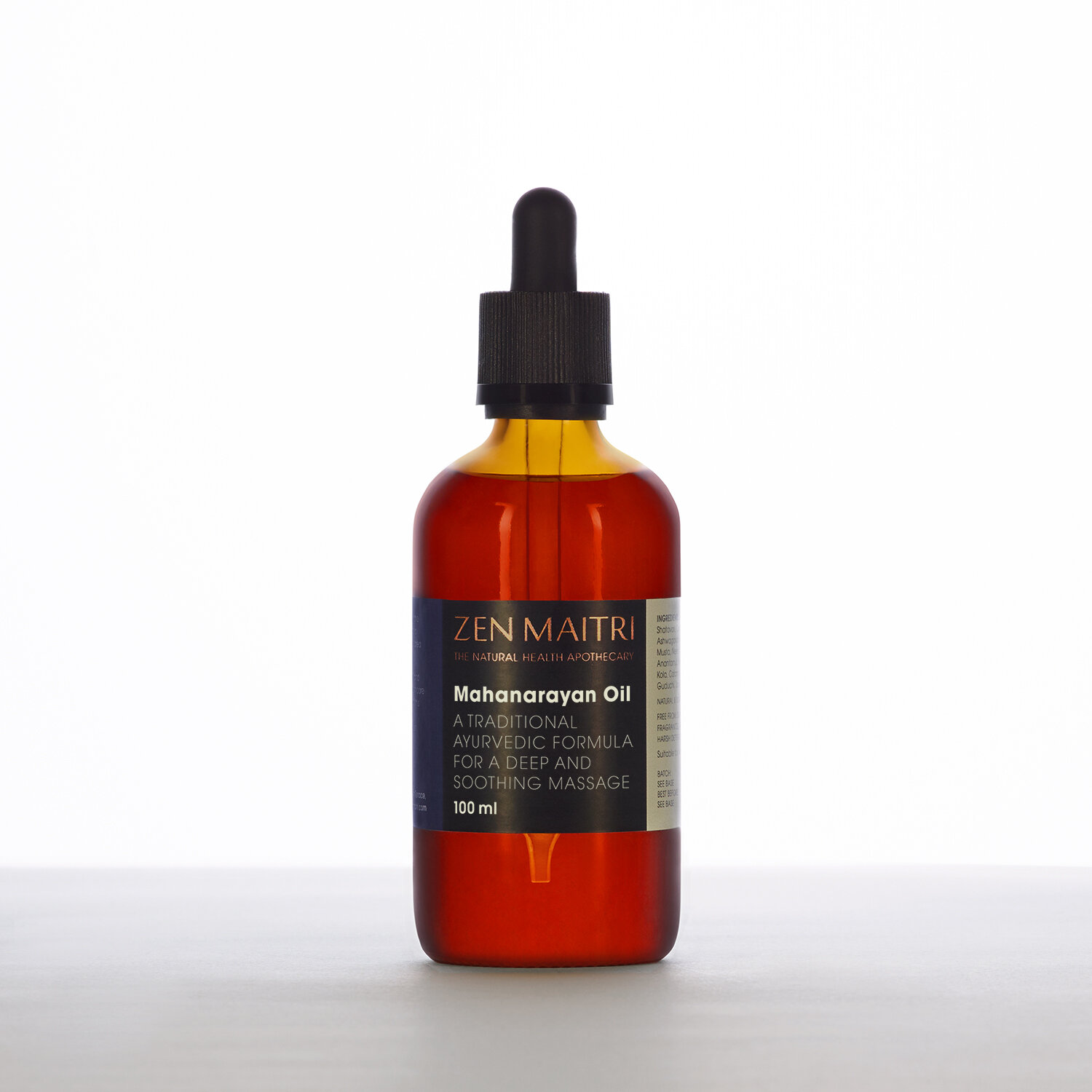In this blog we're going to answer some common questions including:
- What is Ayurveda?
- Why is it important to use Ayurvedic oils?
- What is the difference between Nasya and Mahanarayan Oil?
Before we get into discussing Ayurvedic oils - in particular, Mahanarayan and Nasya - let’s begin with a little background on Ayurveda.
What is Ayurveda?
Ayurveda is a traditional system of medicine which originated in India. Ayurveda translates from the Sanskrit root, Ayur, meaning ‘Life’ and Veda, meaning ‘Knowledge’. It’s a system of knowledge of the practices, techniques and remedies that promote a balanced state of health and assist with treating imbalances when they arise.
According to Ayurveda, the universe and everything in it is made up of the Pancha Mahabhutas, the five great elements: space, air, fire, earth and water. Ayurveda states that these five elements come together in varying proportions to form three doshas. Within each of these three doshas, one or two elements are dominant.
The three doshas determine both the structure and function of the human body in each individual and how it interacts with the environment. Every person is born with a unique Prakruti (constitution), comprising the three doshas, Vata (ether and air), Pitta (fire and water) and Kapha (earth and water), in varying proportions.
Ayurveda provides us with the knowledge and tools to determine our constitution, our nature and most importantly, how to maintain its balance and restore equilibrium should imbalance arise.
Ayurveda is primarily concerned with preventing imbalances in a person’s Prakruti by providing guidance on an appropriate diet, lifestyle and the daily and seasonal routines which assist with maintaining a person’s state of health and well-being.
Part of that guidance includes the use of oils, both internally and externally as part of our daily routine.
Why are Ayurvedic Oils Important?

The use of oils is given great value in Ayurveda. They can improve our general health, boost our resistance to disease and illness, and more generally are seen as a way of nurturing ourselves.
If we take a moment to consider the immune system, it acts as a barrier. It stops pathogens from entering the body from the outside environment, whether it be our skin or the mucosa lining our GIT, genitourinary, and respiratory tracts. Using oils to lubricate, nourish, and strengthen these parts of the body is a helpful way to support the immune system.
There are two types of Ayurvedic oil we’re going to focus on today: Mahanarayan Oil and Nasya Oil.
Mahanarayan Oil is a traditional Ayurvedic herbal oil primarily used for external use on the body. On the other hand, Nasya Oil is a medicated herbal oil for internal use within the nasal cavity.
Nasya Oil

Nasya Oil eases congestion and sinus inflammation.
Nasya in Sanskrit means ‘related to the nose’. It is one of the Pancha (five) karma (actions) treatments used in Ayurveda to expel accumulated doshas from the body - in this case from the nose and sinus area.
If you think about it, the nose is in direct contact with the external environment, making it more sensitive to pollutants and allergens in the atmosphere. An increase in environmental air pollution and increased exposure to other airborne allergens has caused an increase in people experiencing conditions such as allergic rhinitis and sinusitis.
Nasya Oil is used in Ayurveda to lubricate and cleanse the nostrils, sinuses and nasopharynx.
How to Use Nasya Oil
It can be used in two ways. Firstly, it can be used to lubricate the nostrils by dropping the oil onto the index finger and gently massaging the inside of the nostrils. This method will assist with moisturising, protecting and nourishing the mucous membrane lining the nostrils. It also improves the integrity of the nasal mucosa barrier within the nose, which protects us from invading pathogens.
This way of using Nasya Oil is particularly helpful in the winter when the cold weather and central heating can dry out the air and as a result our nasal mucosa.
Secondly, Nasya can be used in a more specific way to assist with particular symptoms. There are a number of different Ayurvedic formulas for Nasya Oil to support those experiencing a wide variety of conditions including, insomnia, depression, migraines, headaches, congestion and sinus pain.
Zen Maitri’s Nasya oil is specifically formulated to assist those suffering from congestion and sinus inflammation. It is designed to cleanse and decongest the nose and sinuses by thinning mucus secretions. This method of using Nasya Oil is best done following a steam inhalation for 1-2 minutes.
Simply pour boiling water into a bowl or the sink and place a towel over your head, allowing your face to be exposed to the steam for a couple of minutes. Following this, lie down with your head tilted back. Once you’re in a comfortable position, place 3-5 drops of Nasya Oil in each nostril and sniff deeply. Wait for a few moments before expelling any oil or mucus which comes to the mouth.
The key ingredients in Zen Maitri’s Nasya Oil include:
- Sesame Seed Oil
- Skullcap
- Himalayan Rock Salt
- Eucalyptus Essential Oil
Sesame oil is a base in many Ayurvedic oils due to its potent anti-inflammatory action, making it one of the most nourishing and unctuous oils for lubricating the nostrils and sinuses.
Skullcap is a nervous system tonic, as well as having anti-inflammatory and pain-relieving properties. It is particularly useful for painful and inflamed sinuses. Eucalyptus Essential Oil is used to decongest the nose and sinuses and reduce excessive mucus secretions. It also has antiseptic properties so works to assist with preventing respiratory and sinus infections.
Himalayan rock salt works to clear and soothe the nose and sinuses.
Mahanarayan Oil

Mahanarayan Oil eases aches and pains in the muscles and joints - particularly those that arise in winter.
Mahanarayan oil is a traditional Ayurvedic formula which can either be used as a whole-body rejuvenation treatment or applied to specific areas to assist with pain, inflammation and arthritic conditions of the musculoskeletal system.
The Vata (air and ether) dosha is thought to be responsible for pain, cartilage degeneration and wear and tear of the cartilage in osteoarthritis. Mahanarayan Oil is thought to pacify the Vata dosha, providing protective effects against wear and tear of the cartilage and increasing synovial fluid lubrication around the joints.
Some of the key herbs in our Mahanarayan Oil are:
- Ashwagandha
- Turmeric
- Gotu kola
- Ginger
Ashwagandha is one of the most well-known adaptogens in Ayurveda. It is also anti-inflammatory, anti-arthritic and analgesic. Applied externally it can assist with aches and pains in the muscles and joints as well as nerve-related pain and numbness. Turmeric is one of the most well-known anti-inflammatories in herbal medicine. In addition to this, it has pain-relieving properties and assists with maintaining the tone of ligaments.
Gotu kola is antispasmodic, vulnerary (wound healing) and a nervine, which means it strengthens, nourishes and supports the nervous system. It assists with relaxing the whole musculoskeletal system and supports healthy collagen production of the skin. Ginger is used as a circulatory stimulant, to increase the flow of blood and nutrients to the tissues. It also has pain-relieving properties.
Which to Choose: Mahanarayan Oil, Nasya Oil, or Both?

It’s not really a case of choosing between Mahanaryan Oil and Nasya Oil. Both are complementary and perfect for the cold winter months.
Mahanarayan Oil is perfect for massage and external use on the body. Nasya Oil is a medicated herbal oil that works wonders within the nasal cavity.
If you are feeling aches and pains in the muscles and joints or if you would simply like to treat yourself to some much-needed rejuvenation, a massage with soothing Mahanarayan Oil is a perfect choice.
If you are prone to nasal congestion or sinus pain, which is then being aggravated by dry air from central heating and the colder weather, we recommend giving Nasya Oil a try.
If you are interested in learning more about how medicated herbal oils can support your health and wellbeing, book in for a 30-minute Express Health Consultation or head down to our store in Chiswick. Our Medical Herbalists will be happy to help.



Leave a comment